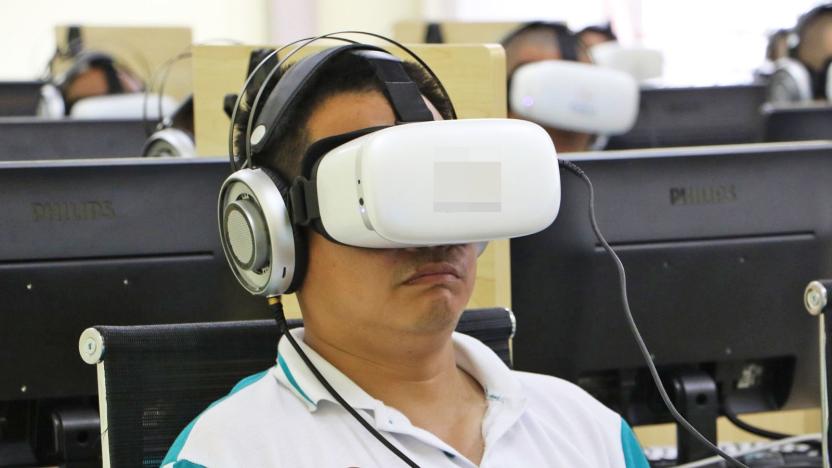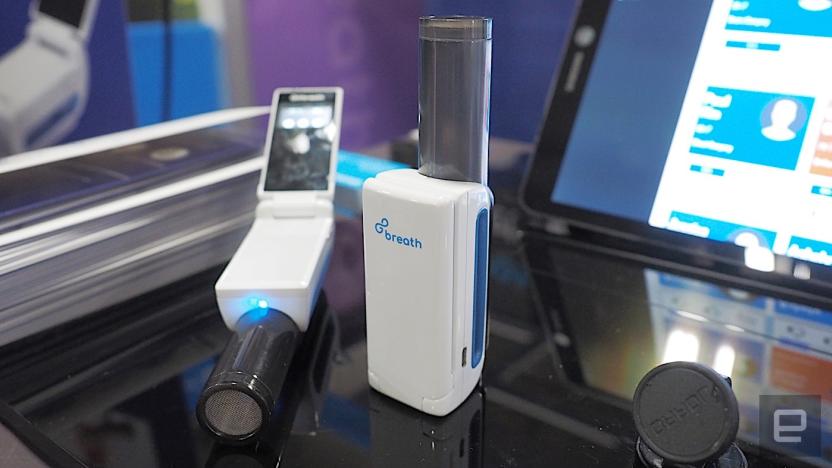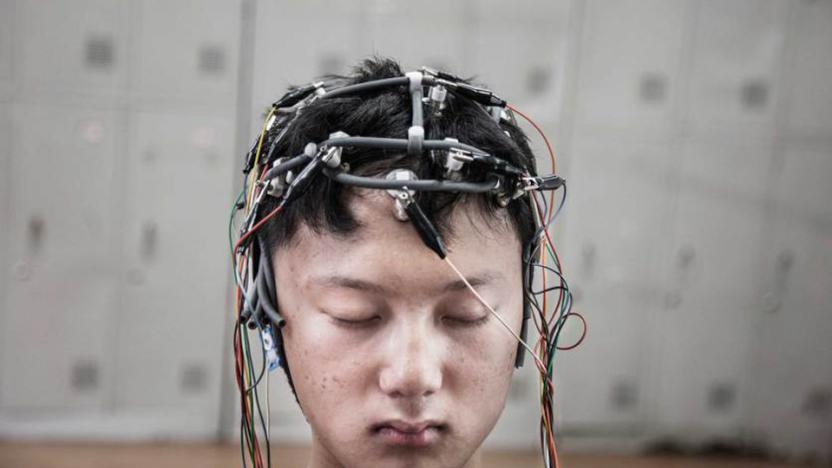rehab
Latest

China uses VR eye tracking to gauge success of drug rehab
China's rehab centers are no strangers to using technology to treat addiction. The latest approach, however, is rather unusual. Shanghai drug rehab facilities (not pictured here) are trialing a combination of VR, eye tracking and skin sensors to both aid in recovery and gauge its effectiveness. Recovering addicts have to look at images and video illustrating the effects of drugs, and the eye monitoring can help determine their reactions, including whether or not they're paying attention in the first place. Think of it like a (relatively) gentler version of A Clockwork Orange's Ludovico treatment -- patients can't look away from the unpleasant imagery without their overseers knowing.

GoBreath makes fixing your lung capacity fun
If you have issues with breathing after chest trauma, surgery or anesthesia, then there are breathing exercises designed to help. Normally, your ability to breathe is calculated by using a spirometer, which isn't that interactive -- or accurate. That's what prompted a team of Korean designers to begin working on GoBreath, a digital spirometer that tries to make breathing exercises fun. It's another one of Samsung's C-Lab projects to try and spin out neat product ideas from the Korean behemoth.

The Big Picture: Monitoring the brains of online game addicts
Online game addiction is a real problem, and some countries are willing to take drastic measures to get these players living a healthier lifestyle. Need proof? Just look up. Photographer Fernando Moleres recently visited an internet gaming rehab camp in Beijing, and saw the facility monitoring the brain activity of addicts using the elaborate device you see above -- the camp wants to see that your mind is changing. The facility also relies on a mixture of medicine, military social structure and psychotherapy to set patients straight. It's hard to know if these "tough love" measures are truly effective, but their very existence reveals just how widespread compulsive gaming has become.

ReWalk rehab exoskeleton goes home with a patient
The FDA may have only cleared the ReWalk exoskeleton for home use just two weeks ago, but it's already finding use outside of hospitals and clinics. Retired US Army Sergeant Theresa Hannigan (shown meeting the President in March) has become the first patient in the US to take one of the mobility machines home, letting her walk and reclaim much of the independence she lost after being paralyzed. The Argo-made gear is expensive to own at nearly $70,000, but the Department of Veterans Affairs plans to cover the cost of ReWalk technology for Hannigan and anyone else who's eligible to use it. The exoskeletons will have some positive side-effects, to boot -- since recipients are much more active, they reduce the chances of heart disease and other conditions that might take them back to a doctor. [Image credit: Debbie Hill-Pool/Getty Images]

Vikings' Adrian Peterson rehabs using specially-designed games
Adrian Peterson, star running back for the Minnesota Vikings, suffered a torn ACL in December 2011. As part of Peterson's regiment to rehab his injured knee, he played Wii Fit and other specially-designed games to regain strength and balance.As seen in a video on the team's site, Peterson uses a leg press machine to guide an on-screen icon through a maze of boxes in one game, and dodge falling balls in another. The exercise machine strengthens his knee while also providing him with something other than agonizing pain to focus on. With the high-powered training programs they're used to, it's interesting to see a pro football player include games like these as part of their recovery methods.

Vibrating glove gives piano lessons, helps rehab patients regain finger sensation and motor skills
We've seen a good number of electronic gloves before, and now researchers at Georgia Tech have devised one to rehabilitate patients who suffer from paralyzing spinal cord injuries while teaching them how to tickle the ivories. Christened Mobile Music Touch, the black mitt pairs with a keyboard and cues individual fingers with vibrations to play notes. The handgear also buzzes constantly for several hours to stimulate recovery while users go about their day, similar to another yellowjacket-developed solution. After treatment, some patients could pick up objects and feel textures they hadn't been able to -- especially remarkable since, according to the university, little improvement is typically seen a year after injuries are sustained. Folks who learned to play the piano with the device also experienced better results than those who did without it. Project leader Dr. Tanya Markow believes that the rehab's success could be caused by renewed brain activity that sometimes lies dormant. For the full skinny, head past the break for the press release and a video of the gauntlet in action. [Thanks, Timothy]

Newcastle University neuroscientists use video game for stroke rehab
Video games aren't neuroscience, unless they're helping stroke victims recover physical function in a scientific, medical capacity: then they're totally neuroscience. The above video shows off Circus Challenge, an action game from Newcastle University and Limbs Alive Ltd designed to help stroke patients regain motor control of their weakened hands and arms.Circus Challenge uses "next-gen" motion controllers – not the Wii, as other rehab systems have – to have patients fling pies at clowns, juggle, dive and perform other Big Top-inspired feats, with the difficulty progressing as motor skills improve. Newcastle received £1.5 million from the Health Innovation Challenge Fund for its project, and hopes to use the funds to provide remotely monitored, at-home therapy for stroke patients.Aside from all the philanthropy and innovation in the Circus Challenge project, we think the game design is pretty pretty as well. Check it out for yourself up top.

Neuroscientists develop game for stroke rehabilitation, give the Wii a run for its money
Think the Wii has the market cornered on gaming rehab? Think again -- neuroscientists at Newcastle University are developing a series of motion controlled video games to make stroke rehab more fun and accessible. The team's first title, dubbed Circus Challenge, lets patients digitally throw pies, tame lions and juggle to help them build strength and regain motor skills. As players progress, the game ratchets up its difficulty, presumably to match pace with their recovery. Although Limbs Alive, the game's publisher, has only described their motion controller as "next-generation," it affirms that the game will be playable on PCs, laptops and tablets later this year. In an effort to lower costs and provide at-home therapy, the team hopes to leverage a £1.5 million award from the UK's Health Innovation Challenge Fund to build a system that will allow therapists to monitor patient progress remotely. The whole enchilada still needs some time to bake, but you can hit the break for a video and the full press release.

Android trash can robot begs the question: 'Why are you hitting yourself?' (video)
We've seen robots that look like they've had one too many, but we're pretty sure this little guy needs to check into rehab. Despite its absolutely adorable appearance, this Android seems hell-bent on destruction, literally beating itself up, and eventually falling on its face. Built using the requisite Arduino, a trash can, some LEDs, and a slew of other components, this little guy was apparently created in three days on a budget just barely exceeding $100. You can see a video of the waste-bin bot hitting rock bottom at the source link below, but please refrain from laughing; Android alcoholism is a serious issue.

LOPES rehab robot gets bodies moving -- no relation to JLo (video)
That's LOPES (Lower-extremity Powered ExoSkeleton) -- not Lopez -- and while this rehab robot can get otherwise disinclined parties to move their butts, it doesn't resort to monotonous dance beats to do so. Researchers at the Netherlands' University of Twente began work on LOPES in 2001 to assess motor skills and teach stroke victims how to walk again. Ten years later, LOPES -- which looks like Forrest Gump's leg braces on steroids -- now sports eight degrees of freedom and automatically adjusts to fit the specific support needed per patient. LOPES' overlords are working on a more compact and user friendly iteration, and expect a market-ready version to be available by mid-2012. In the meantime, LOPES has been enlisted in a larger EU project called Mindwalker, testing advanced control algorithms "to be used in autonomous exoskeletons." Video of the future real-life RoboCop after the jump. [Thanks, Mike]

New UK Internet Addiction clinic offers in-patient therapy to 'screenagers'
Internet addiction, as you know, is a growing worldwide concern. Recently, the UK opened its first rehab clinic for Internet Addiction (the provocatively named Broadway Lounge), but that was only the beginning. Capio Nightingale Hospital in London has announced its own plan to get gets out of the World of Warcraft and into the real world through an intensive in-patient, day care, or group therapy environment. The program is aimed at 15 to 17-year-olds, although kids as young as 12 could participate. A hospital spokesman said that the service hopes to "address the underlying causes of this addiction to transform screenagers back into teenagers." And if you thought we were running this because we wanted to use the word "screenagers," you might be on to something.

Scientists using Balance Board in stroke rehab
While the Balance Board is a good tool for controlling cute little monkeys and perhaps creating a career, Australian scientists have found it's also an inexpensive way to measure the balance in stroke patients. University of Melbourne scientist Ross Clark decided to pick one up after reading that some physicians were using Wiimotes to help recuperating soldiers, and found it to be "an extremely impressive strain gauge set-up." That's a very good thing, considering the only alternative is a "force platform" which can set scientists back a hefty £11,000 ($15,700). There aren't any results out of Melbourne yet, but if you're interested in what's under the hood of that little plastic pad you're slowly turning a kind of brownish-black (would it kill you to wear clean socks when using it?), check out this Nintendo Channel video from back in the day. [Via Kotaku and New Scientist]

China bans corporal punishment in internet rehab, UK and USA open up their own clinics
China's, how to say this, unorthodox rehabilitation methods, which involve "beating and confinement" of internet addicts, have finally been fully outlawed. Following the death of one teenager due to the treatment he received at an addiction camp, the Chinese Health Ministry has come out with a statement to say corporal punishment and methods restricting personal freedom "are strictly forbidden." In the meantime, the UK and USA are playing catch-up by opening up their own computer addiction camps, which have been described as residential internet detox clinics. Their genius ploy to get you off the web juice has been to go cold turkey and teach people to do chores as a distraction (really, chores and boredom are the cure and not the disease?). The British version even has a 12-step program, but we advise doing what we all did -- if you find yourself spending most of your time on the internet, just become a full-time blogger. Read - China bans tough treatment of young Web addicts Read - Britain's first computer rehab clinic opens Read - Clinic for internet addicts opens in US

Kick your WoW habit with ReSTART clinic
Just when you think this kind of thing can only happen in the Netherlands, along comes ReSTART, a Washington state-based rehab center that offers a 45-day course of treatment crafted to help you kick your internet or World of Warcraft addiction. Oh, and it's all offered at the bargain price of $14,000! "We've been doing this for years on an outpatient basis," Hilarie Cash, the center's director, told the AP. "Up until now, we had no place to send them." Of course, if you want to kick your WoW addiction for just a little bit less cash, the serious professionals of the Joystiq Internet Rehabilitation Clinic Staffed By Serious Professionals have some fine replacement therapies to recommend.

Hospital puts Wii to use, surgeons praise it
We all know about the relationship between surgeons and the Wii. No, we don't mean Trauma Center, we mean real-life doctors using the tech behind the Wii to train them for surgery. This piece from ABC7 news in California shows one hospital where it's being put to work.Surgical resident, Jeff Henke, commented that "this does really help." He further added that it "prepares you to enter the operating room." Now, we may be a bit biased, but we're not surprised that the Wii is such a diverse system. it's used to doing what no video game console could in the past.[Via Codename Revolution]

Hospitals now less boring -- Fun Centers on the way
Sick kids are in for some fun, thanks to Nintendo and the Starlight Foundation. The Wii is heading for hundreds of hospitals in North America and Canada, all bundled up in Fun Centers packed with awesome stuff. Rehabilitation seems to be the Wii's favorite word, as Nintendo manufactures 1250 Fun Centers -- with 500 to be in place by the end of the year.The Fun Centers come with a Sharp flat-screen TV, a DVD player and a Wii with a bunch of games including Super Mario Galaxy, Wii Sports and Mario Party 8. What, you were expecting Resident Evil 4?Paula Van Ness of Starlight said "Our Fun Centers transform the hospital experience for children, bringing enjoyment and laughter to an otherwise daunting experience." Yeah, damn straight it's daunting -- and what did the friendly hospital staff bring this blogger when he was down and out with appendicitis? Battletoads. Yeah, the most ball-breakingly difficult game ever conceived didn't make the hospital stay any more fun.[Via press release]

Wii Fit the new go-to for rehab clinics?
Where in the past Wii Sports has been the ideal Wii-based solution for rehabilitation patients, Nintendo's newest craze, Wii Fit, is now stepping up to show everyone that it has something to offer outside of a really fun hula hoop mini-game. Now, sports trainers are looking to Wii Fit to help rehabilitate injured athletes. "We are looking to incorporate Wii Fit into the athletic training room as far as rehabilitation, for example, on post-operative knees and ankles," said Sue Stanley-Green, professor of athletic training at Florida Southern College. She noted that the success of the console in other rehab scenarios fueled their interest in Wii Fit, stating that "Fitness-oriented video games are also being used more and more in nursing homes for rehabilitation," also adding "Fitness video games have some really good potential to improve fitness in everyone."%Gallery-24459%[Via Engadget]

Wii Fit already carving up bods, finding use in rehabilitation
From the get-go, Nintendo's latest console was seen as a dream come true for folks who'd love to lose a few pounds, yet would rather log a few hours on the couch rather than the track. Shortly after the Wii Fit's launch, we're already seeing another wave of dedicated users reporting weight loss, and the trend is even bleeding into the medical field. According to Sue Stanley-Green, a professor of athletic training at Florida Southern College, the Wii Fit and other fitness-related games have "great potential for core strengthening and rehabilitation and may boost compliance with rehabilitation exercises." She also noted that these games were "being used more and more in nursing homes," and particularly with youngsters, titles such as Wii Fit are the only ones that stand a chance at getting them active. We can't decide if that's a positive thing or just downright depressing.[Thanks, Juergen]Read - Wii Fit in rehabRead - Wii Fit weight loss

CNN talks gaming for health
CNN is all over the Wii Fit thing. First, they had Mario Armstrong come in and demo the package for them, now Dr. Sanjay Gupta is taking time out to discuss the benefits of using games as a health tool, namely in the rehabilitation sector. We've heard stories about places using Wii to help rehabilitate their patients, but it's now gaining more ground, as Dr. Gupta mentions the Robert Wood Johnson Foundation is funding 12 different studies that will specifically see if games can be used as a means for making us healthier individuals.If all the serious medical talk bores you, then laugh at the CNN employees doing the hula hoop minigame while one the Balance Board. They really get into it. %Gallery-4745%[Via Go Nintendo]

Wii + rehab = Wiihab, the cycle is now complete
It's not the first we've heard of the Wii being used for rehabilitation context, but it would appear "Wiihab" is becoming increasingly frequent. According to the AP, hospitals in states like Missouri, Illinois, and North Carolina, and even Walter Reed Army Medical Center are all incorporating the Wii into physical therapy routines. Just in time, too, it would be really weird if Wiiitis or a nasty Wiinjury landed you in the hospital in the first place, your doctor used a Wii to hone his steady hand, and you didn't actually get to use a Wii to get your ass well enough to be discharged. Ah, what a world.








